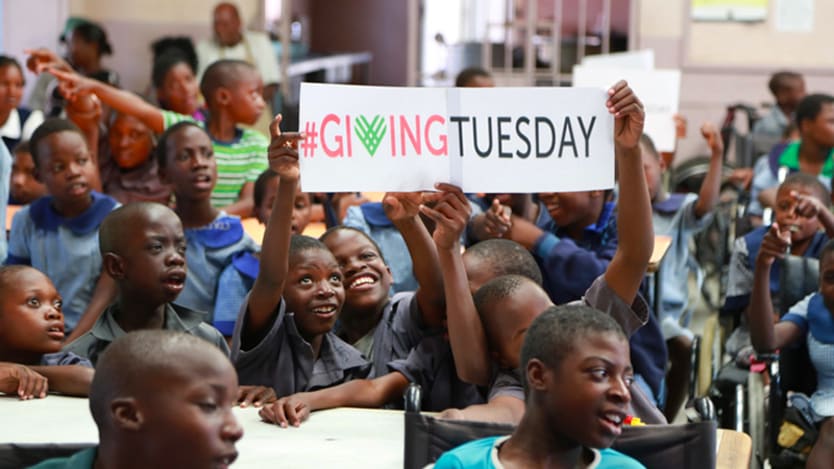
SAN FRANCISCO — GivingTuesday aims to drive giving in the same way that Black Friday and Cyber Monday have driven shopping in stores and online.
This year, the organizers of the global effort, which spun out into an independent nonprofit organization in July, are publishing new findings about the impact of the campaign and strategizing how to keep the momentum going beyond the Tuesday after Thanksgiving.
A small team at 92nd Street Y, a cultural center in New York City, created GivingTuesday in 2012. The grassroots movement, which encourages people to do good and share on social media with the hashtag #GivingTuesday, has since taken off in the United States and beyond. Now, people are participating in every country, forming what the GivingTuesday team describes as a “global generosity movement” that encourages individuals to support the causes they care about.
“We’ve always had this idea that people will see every Tuesday, all year round, as our day to wake up and be generous.”
— Jamie McDonald, chief strategy officer, GivingTuesdayIn 2018, when around $400 million was raised in the U.S. alone, the campaign broke a billion dollars in online donations given since its inception.
“While there have been declines in individual giving and a consolidation of giving into fewer and fewer givers, GivingTuesday is a countertrend,” said Asha Curran, CEO of GivingTuesday, who previously led 92nd Street Y’s Belfer Center for Innovation & Social Impact. “We see increased giving that’s shifting donor behaviors and largely coming from everyday donors rather than big, individual philanthropists.”
More on fundraising:
► GiveWell is exploring giving opportunities that are more difficult to measure
► How to build a Muslim specific funding strategy
► Nonprofits explore the newest fundraising frontier: Cryptocurrency
Initially, the campaign was heavily driven by social media, with posts using the Twitter hashtag #GivingTuesday. As global interest in GivingTuesday grew, a number of people from around the world were working on the project on a part-time basis. Eventually, many of the individuals involved saw the need to create an independent nonprofit.
“We felt that to support it appropriately, to innovate, to be strong partners to the leaders, we needed the independence and freedom to grow the movement as we believed it should be grown,” Jamie McDonald, chief strategy officer at GivingTuesday, told Devex.
GivingTuesday celebrates giving in all its forms — not just donating money — and seeks leaders from countries around the world who can inspire generosity in a way that is locally or culturally relevant, she said.
There are country campaign organizers in 60 nations, all reporting to Kait Sheridan, who is based in Hong Kong. She has initial conversations with anyone interested in taking the lead in a particular country to get a sense of what their vision is, how connected they are, and whether they can support the GivingTuesday value of generosity in all its forms, McDonald said.
Country leaders join an international network that collaborates year-round through virtual conversation — all country leaders are included in a single WhatsApp group, for example — and at an annual global summit.
To help the movement take off in more places, the GivingTuesday team uses a framework they describe as “share, learn, adopt, and adapt.”
In Russia, for example, country leader Masha Chertok is encouraging people to be more open about their giving in order to encourage others to do the same. In Liberia, country leader Z.J. Jallah is using GivingTuesday as a way to mobilize Liberian youth to give to causes that support a better future for their country. And in Brazil, João Paulo Vergueiro is helping organizations that previously relied solely on government funding to raise money from individuals.
These leaders know what works in their countries and share best practices with others in the GivingTuesday network, who can modify and apply those approaches in their own contexts, McDonald said.
One of the most exciting parts of the GivingTuesday movement is how people have taken it and made it their own, she added.
“We don’t view ourselves as the leaders of the movement,” McDonald said of GivingTuesday team members. “We view ourselves as the nucleus of the movement.”
The Giving Block, an organization that helps nonprofits accept cryptocurrency donations, is organizing the first-ever Bitcoin Tuesday this week, for example. Using the Twitter hashtag #BitcoinTuesday, it will share a landing page on social media featuring nonprofits that accept cryptocurrency donations.
Alex Wilson, co-founder of The Giving Block, said the organization is bringing together major stakeholders from across the cryptocurrency community to provide financial and marketing support to the more than 100 participating nonprofits.
Charity assessment organization GiveWell, meanwhile, updates its list of top charities ahead of GivingTuesday each year in order to make the most up-to-date information available when the organization expects some of its highest levels of web traffic.
The vast majority of donations to GiveWell and its recommended charities are made in December, said Catherine Hollander, senior research analyst at GiveWell. On GivingTuesday 2018, the organization received seven times its average daily web traffic — the highest level for any day that year — she said.
While GivingTuesday has driven a steep increase in giving on the Tuesday after Thanksgiving, the organization hopes to make a difference every week of the year.
“We’ve always had this idea that people will see every Tuesday, all year round, as our day to wake up and be generous,” McDonald said.
Donors who give during this 24-hour period are 10% to 15% more likely to give again than those acquired through other fundraising campaigns, according to the GivingTuesday Data Collaborative, a new effort to analyze drivers of giving and other trends in philanthropy.
Nonprofits who look to GivingTuesday as a major fundraising moment can reference this research as they look to build on this day of generosity to increase recurring giving.








